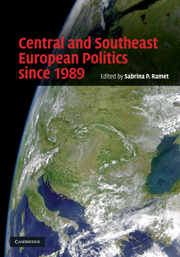Book contents
- Frontmatter
- Contents
- List of figures and maps
- List of tables
- Notes on the contributors
- Preface
- List of acronyms and abbreviations
- Guide to pronunciation of Central and Southeast European words
- 1 Central and Southeastern Europe, 1989
- 2 Central and Southeastern Europe, 2009
- Part 1 Introduction
- Part 2 Issues
- 3 The emergence of the nation-state in East-Central Europe and the Balkans in historical perspective
- 4 Central and East European party systems since 1989
- 5 Economic reforms and the illusion of transition
- 6 The War of Yugoslav Succession
- Part 3 Central Europe
- Part 4 Yugoslav Successor States
- Part 5 Southeastern Europe
- Part 6 Former Soviet republics
- Part 7 Present and future challenges
- Index
- References
5 - Economic reforms and the illusion of transition
Published online by Cambridge University Press: 05 June 2012
- Frontmatter
- Contents
- List of figures and maps
- List of tables
- Notes on the contributors
- Preface
- List of acronyms and abbreviations
- Guide to pronunciation of Central and Southeast European words
- 1 Central and Southeastern Europe, 1989
- 2 Central and Southeastern Europe, 2009
- Part 1 Introduction
- Part 2 Issues
- 3 The emergence of the nation-state in East-Central Europe and the Balkans in historical perspective
- 4 Central and East European party systems since 1989
- 5 Economic reforms and the illusion of transition
- 6 The War of Yugoslav Succession
- Part 3 Central Europe
- Part 4 Yugoslav Successor States
- Part 5 Southeastern Europe
- Part 6 Former Soviet republics
- Part 7 Present and future challenges
- Index
- References
Summary
In 2004, the well-known Swiss social anthropologist Christian Giordano at a conference in Sofia stated that the post-socialist transition was over because it had never begun. In his paper he referred to the deep historical roots of dependencies and the economic marginalization of the eastern part of Europe by the core of capitalism in the West. In this long perspective the period of socialism was ephemeral, since it was self-evident that half of a millennium of peripheral status cannot be compensated by any form of economic strategy within a short period of time. How, then, can we talk about a quick spurt from socialist economy to capitalist systems that can be considered equivalent to the regions which invented the original? At its best, said Giordano, the capitalist systems of the East are phenomenological copies of the original. The term “transition,” therefore, means nothing other than a transformation from the periphery of the Soviet bloc to the periphery of European capitalism.
What is common between the two forms of hegemony “is the role of external power in setting and enforcing political agendas for the states of the region and thus in influencing domestic political outcomes.” The western democracies entered the politics of the region reluctantly and gradually formulated a list of conditions for its inclusion into its institutional framework: copying the West by economic liberalization, opening of the countries to foreign trade, privatization of state-owned assets and the marketization of prices.
- Type
- Chapter
- Information
- Central and Southeast European Politics since 1989 , pp. 91 - 110Publisher: Cambridge University PressPrint publication year: 2010



